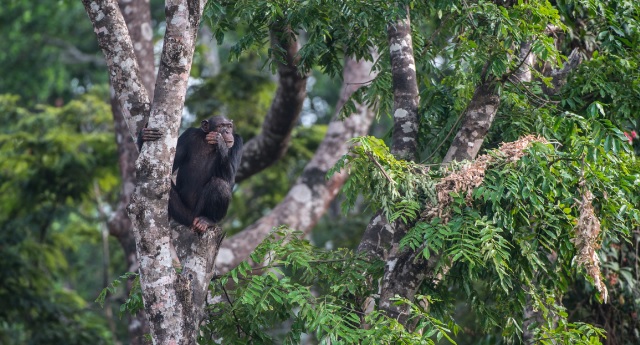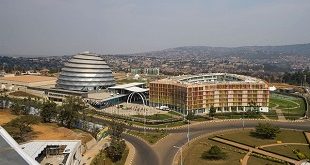
Freetown, Sierra Leone | AFP | They have their hands full at the Tacugama Chimpanzee Sanctuary, where record numbers of orphaned chimps are being delivered to their care, victims of the relentless expansion of human activity.
Poachers hunt them for their meat, farmers shoot them to protect their crops and a lack of political will means more and more of their habitat is being surrendered to urban development and forestry.
Founder of the sanctuary Bala Amarasekaran does not mince his words.
“Over the past 10 years, the environment has suffered much depletion as a result of widespread construction of houses, logging and mining with the approval of corrupt politicians and lands ministry officials,” he said.
Several species of wildlife around the forest, he added, had been wiped out.
The chimps’ plight echoes the core message of the WWF’s new Living Planet report, released Tuesday: that the devastation of the planet’s wildlife is mostly down to “runaway human consumption”.
Over the past three months, the Sierra Leone sanctuary has received seven orphaned chimps, a record number. But those figures only hint at the true scale of the slaughter, said Amarasekaran.
They calculated that for every chimp they received, up to 10 others could have been killed. Over the past three or four months then, between 70 and 100 chimpanzees could have perished.
– ‘Sometimes they even cry for me‘ –
“Most chimps that arrive at the sanctuary are less than five years old and would still be suckling milk from their mothers,” said Mama Posseh Kamara, who acts as surrogate mother to the new arrivals at the sanctuary.
“Many have lost their mothers to bush meat hunters, abandoned or illegally sold as pets,” she explained.
As she spoke, she fed milk to one of her new charges, a four-month-old baby chimp, as several others climbed over her back and head.
“I have been doing this job for the past 14 years,” she said. “They usually see me as their mother because I feed and clean them daily. Sometimes they even cry for me.”
While they do what they can to protect the animals’ habitat, their efforts are often frustrated by the actions of local officials, said Amarasekaran.
“We planted over 4,000 trees around the National Park area in Freetown,” he said.
“But city planners gave it away for the construction of dwelling houses, due to lawlessness, greed and corruption.
“Government should stop all human activities around our forests to protect biodiversity. If we continue to deplete our environment there will be nothing left for the future.”
– ‘Obsolete’ laws –
Western chimpanzees are the only critically endangered chimp subspecies. They have already been wiped out in Burkina Faso, Benin, Gambia — and possibly Togo too.
According to The American Journal of Primatology, their population plunged more than 80 percent between 1990 and 2014. And Sierra Leone is home to about 10 percent of an estimated 55,000 still living wild.
And the loss of their natural habitat is only making the situation worse.
“Sierra Leone is losing a lot of forest cover, due to human activities,” the Food and Agriculture Organization’s (FAO) local representative Nyabenyi Tito Tipo told AFP during her visit to the sanctuary.
“Our forests need to be protected, regenerated and not depleted,” she added.
But for Papanie Bai Sesay, biodiversity officer at the Conservation Society of Sierra Leone, there are two problems with Sierra Leone’s current conservation laws.
“We have obsolete wildlife laws, which date as far back as 1978,” he explained.
But the other problem was more fundamental, he added.
“Our current forest conservation laws and policies are also not enforced by authorities.”
– Battling deforestation –
Beran Forster, an assistant director at Sierra Leone’s Environmental Protection Agency, acknowledges the scale of the problem.
“The major impact on the environment in Sierra Leone is human expansion into wildlife areas, bush fire to clear lands and hunting wild animals for bush meat,” he said.
“Deforestation through unsustainable logging practices for exporting of logs is the worst situation the environment is faced with,” he added.
In response, they were trying to educate local people on the effects of deforestation and replant across the country.
International partners, such as the US Embassy in Freetown are also helping.
They are financing an agricultural project to improve crop diversity in a sustainable manner, engaging the local villages near the Tacugama Sanctuary.
But change needs to come soon, warned Amarasekaran.
The Freetown National Park boasts a high level of biodiversity: large numbers of species of both plant and animal life, including snakes, birds, butterflies, chimps and other monkeys, he said.
But, he added: “If we continue to deplete our environment there will be nothing left for the future.”
 The Independent Uganda: You get the Truth we Pay the Price
The Independent Uganda: You get the Truth we Pay the Price



